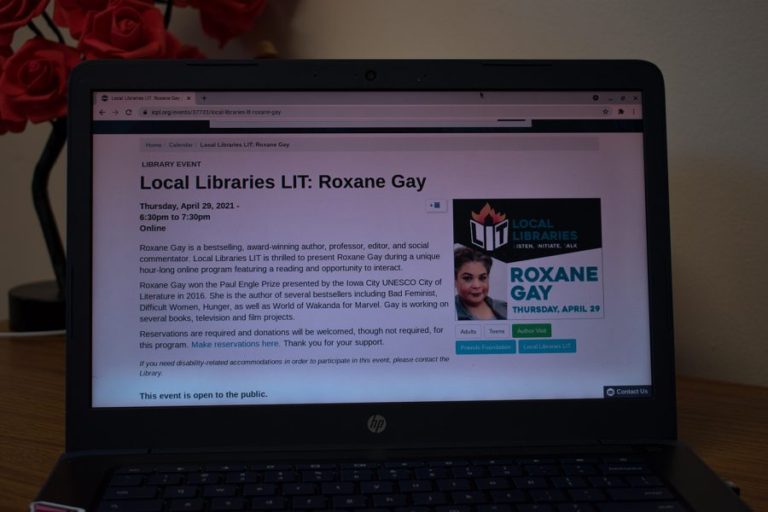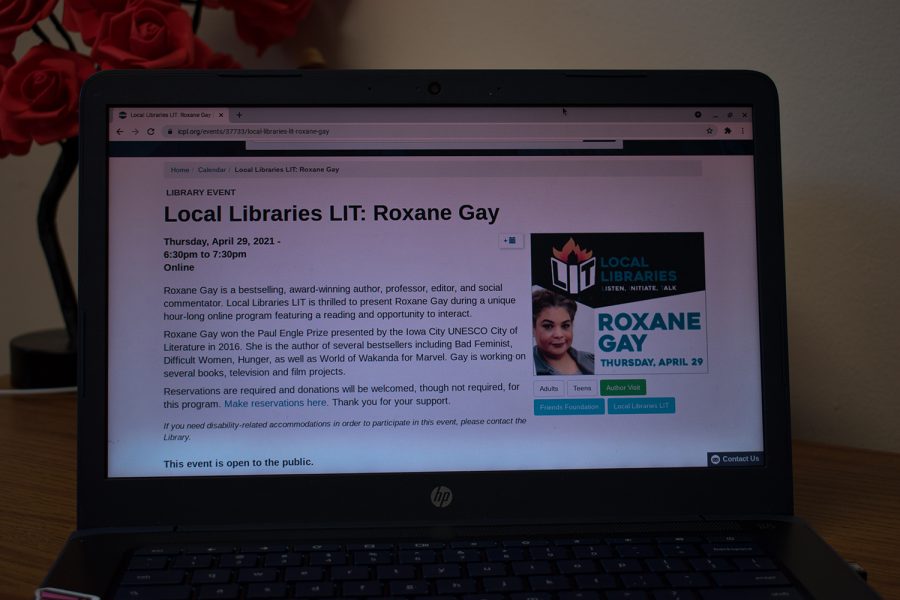

At an online event hosted through Local Libraries LIT last night, Black Panther: World of Wakanda author and professor Roxane Gay read from her essays and answered questions from the audience about craft and internet ethics.
Author of The New York Times best-selling collection of essays Bad Feminist, Roxane Gay sat down last night to read both published and unreleased material and responded to questions during an hour-long online session hosted through Local Libraries LIT, a collaboration between several Johnson County libraries.
The writer of the Black Panther: World of Wakanda Marvel Comics series launched into a discussion about her first essay, “The Pleasure of Clapping Back,” with a reflection on the dangers of being put on a pedestal. It “freezes” us, she writes in the essay, and sets both others and ourselves up for disappointment.
The piece goes on to grapple with the question of what healthy and acceptable online engagement looks like.
“Who actually has healthy habits?” she responded to an audience question later in the night, laughing.
RELATED: Fatima Farheen Mirza reads from unfinished second novel at UI Literary Legends event
Some of Gay’s disappointment in herself, she said, comes from examining her own behavior as a public figure on the internet, where the line between being toxic and reasonably defensive can be difficult to navigate.
Ultimately, it’s not about being perfect, the author said.
“I know I could be better. I choose not to. The distinction between me and my trolls is that I know I am no different than them,” Gay wrote in the essay.
Roxane Gay next read a passage from her upcoming book, How to be Heard.
“Who I am today as a writer began with a broken heart,” she said.
The first chapter of the book follows her trip from a difficult breakup in Nebraska, to getting a PhD in rhetoric and technical communication despite knowing “absolutely nothing about that field” in Michigan, to the moment she decided to “unapologetically” take herself seriously as a writer.
The real focus of her book, however, is what she calls “practical” writing advice.
“One thing we don’t talk about enough is that most writing advice is terrible,” she read to the audience, with particular emphasis.
Gay takes issue with advice that is simple, platitude-heavy, or contradictory, writing that she more often finds herself breaking the rules than following them. People could use more specific and clear cut guidance, she said, when it comes to making life as a writer reality.
Gay advised aspiring writers to simply write. She said too many of the people who come to her looking for professional help — how to get published, for example — haven’t written anything. The secret to the success of writers like Stephen King, Margaret Atwood, and Toni Morrison, she said, is the “decades of work… sitting down as often as possible” to write.
“You can’t blow off appointments with yourself to get writing done,” she said.
Though Gay is most prominently known for her essays, she is also the author of her 2017 memoir Hunger, and short story collection, Difficult Women.
“I think of myself as a fiction writer first and foremost, even though no one else in the world does,” she said.
One member of the audience wanted to know what it was like writing Black Panther: World of Wakanda. Gay said that she was taken in by the immense potential for creative freedom found in the Marvel universe. It felt “exciting,” she explained, “to write two incredible Black lesbians into being who did not die, and who did not fall in love with straight women.”
The topic of possible casting choices for the next Black Panther film came up soon after, and Gay had a few ideas about who might fit the role of hero. Shuri, as played by Letitia Wright, and Lupita Nyong’o’s Nakia seem the most likely candidates in her eyes, but, personally, she’d like to see one of the dora milaje — the Black Panther’s group of personal bodyguards — take up the mantle.
Whatever the case, she said she knows that whatever choice director Ryan Coogler ends up making will honor Chadwick Boseman’s “incredible contribution” because he’s “the right person to steer this ship.”